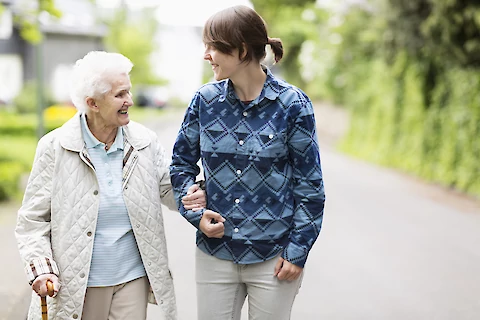
When stepping into the role of a family caretaker for an elderly loved one, clear and compassionate communication is critical. Whether discussing day-to-day tasks or navigating sensitive topics, how you communicate is pivotal in creating a positive, nurturing environment.
At Senior Helpers Northwest Atlanta, we've worked with numerous families to help them navigate this journey. We have some essential communication tips for family caretakers to foster understanding, mutual respect, and a stronger bond in your caregiving relationship. Let's explore how you can make conversations with your loved ones more meaningful and productive.
1. The Importance of Active Listening
Active listening is an essential skill when it comes to communicating with your elderly loved one. This involves more than just hearing their words. It's about truly understanding their thoughts, feelings, and needs, showing them that you genuinely care. Try to limit distractions to focus on your loved one, and give them ample time to express their thoughts without interruption.
2. The Role of Empathetic Responses
Empathy forms the backbone of a healthy and supportive caregiving relationship. Responding empathetically doesn't mean you always have to agree. Instead, it involves validating your senior loved one’s feelings and showing understanding. Just simply acknowledging their feelings can go a long way in making them feel heard and cared for.
3. Understanding Nonverbal Cues
Remember that communication isn't just about words. Nonverbal cues can provide valuable insight into what your loved one is feeling. These include their facial expressions, body language, and even tone of voice. So, keep a watchful eye on these cues, and respond accordingly. This sends a message that their feelings matter to you.
4. Simplifying Language and Explanations
Among the most important communication tips for family caretakers you should learn is being clear and concise in your conversations. It can prevent misunderstandings. When discussing complex issues like health matters, it's essential to break down information into digestible parts. Ensure your loved one understands what you're communicating. Remember, it's okay to repeat or rephrase things if needed.
5. Maintaining Patience in Discussions
Patience is indeed a virtue, particularly in caregiving. Sometimes, communication with your loved one becomes challenging, and that's okay. Keep calm and patient during these moments. Remember, the goal is not to win an argument but to understand and be understood.
6. Tailoring Communication Strategies to Each Unique Situation
Just as every person is unique, so are their communication needs and preferences. Some may prefer direct communication. Others might need a more gentle approach. Take the time to understand your loved one's communication style and adapt your approach accordingly.
7. The Importance of Open Dialogue
Fostering an environment where open dialogue is encouraged can transform your caregiving relationship. This involves being honest about your feelings and open to hearing about their thoughts, fears, and hopes. These open conversations can bring you closer and make your loved one feel more secure and understood.
We Can Help Navigate the Caretaking Journey
Effective and compassionate communication can significantly enhance your caregiving relationship. With the above communication tips for family caretakers, you’ll learn how to better understand and be understood. If you need further support or advice, please contact us at Senior Helpers Northwest Atlanta. We're here to help families across Atlanta, Austell, Lithia Springs, Mableton, and Smyrna navigate their caregiving journeys effectively and compassionately.